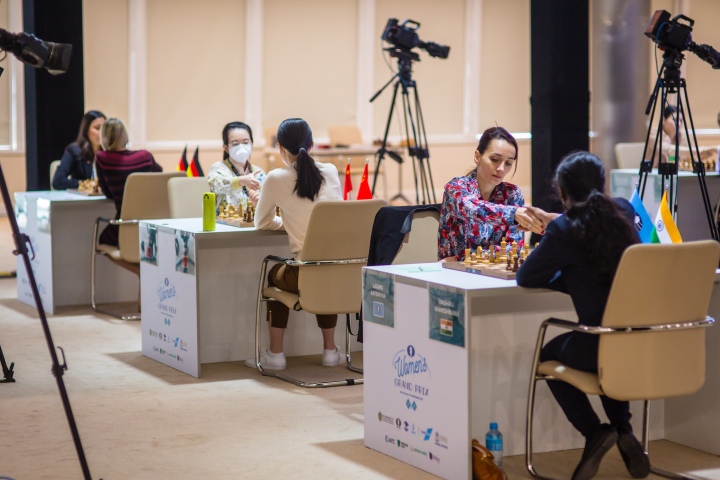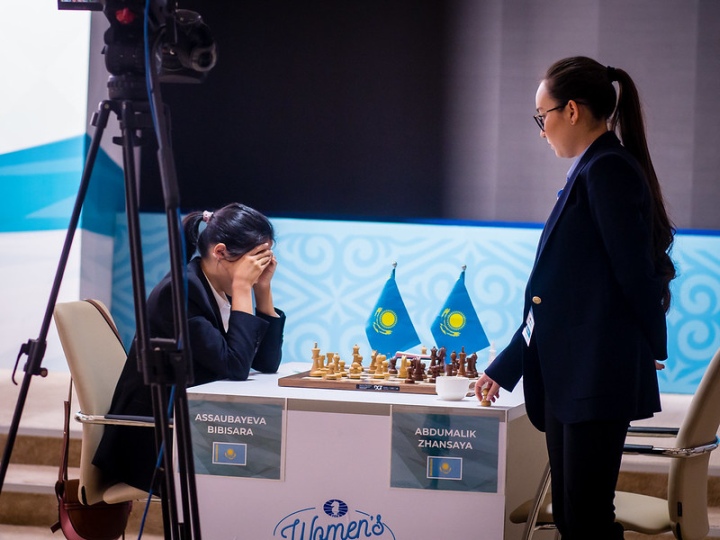Only two players score the win in the first round of the Astana Women’s Grand Prix
The first round of the first leg of the 2022-2023 Women’s Grand Prix kicked off this afternoon in Astana. Undoubtedly, a very special day in the history of the ninth largest country in the world since the name change of the capital – Astana for Nur-Sultan – was legally confirmed.
Definitely, a fitting moment for the commencement of an elite chess event.
International Arbiter Abd Hamid Bin Abd Majid initiated the clocks punctually at three o’clock in the afternoon, and after the customary handshakes and pre-game smiles, the twelve sat down to battle it out.
Only a few minutes earlier, the ceremonial first move was made on the Assaubayeva vs Abdumalik board. Azamat Imashev, Deputy Director of the Republican Sports Development Directorate, advanced the e-pawn to e4; Kazakh’s bright hope quickly returned the pawn to its original square to avoid giving any clues to her opponent and promptly opened with 1.d4.

This event features a new security measure: the 15-minute delay. Although the games begin at the official starting time, the move broadcast and video footage are synchronously “delayed” for fifteen minutes.
Although this does pose a technical challenge for the organizing team, the measure generates a better sense of security for the players at a time when the chess world is especially sensitive to these unfortunate issues.
Another special regulation, much appreciated by chess fans all over the world, is the 30-move rule. Notwithstanding the fact that women’s events are traditionally extremely hard-fought, the regulations of the tournament expressly forbid draw agreements before Black’s 30th has been played on the board, with the exception of draw repetition or statement. Adding to this the 90-minute for 40 moves plus 30 extra minutes time control, exciting games are to be expected.
Kateryna Lagno vs Vaishali R (0.5-0.5)
The first game to finish ended in a three-fold move repetition after 32 moves. The young Indian played a solid Accelerated Dragon Sicilian with Black and equalised comfortably in the opening. After trading most of the pieces, Lagno tried to take advantage of the open d-file but to no avail.

A good result for Vaishali, who kindly joined the Press Officer for a short post-game interview, in which, amongst other things, she explained the reason behind arriving late for the opening ceremony.
Bibisara Assaubayeva vs Zhansaya Abdumalik (0.5-0.5)
The battle between the two top Kazakh women players also ended in a draw, but play was fast and furious. Assaubayeva, with White, went for a topical pawn sacrifice which allowed her to develop a very dangerous initiative. In fact, if she had gone for the promising piece sacrifice with 17.Nxf7, Abdumalik might have been in serious trouble.

“I was lucky” was Abdumalik’s feeling after the game – in her short interview, she also discussed what it’s like to face her compatriot in the first game of the event.
Tan Zhongyi vs Zhu Jiner (0.5-0.5)
The third game to finish was an uneventful draw between the two Chinese representatives. Zhu Jiner has arrived in Astana with added confidence after her stunning win against Hou Yifan a few days ago in the Chinese Higher League.
Her choice of opening this afternoon, the Nimzo-Indian defence, proved a tough nut to crack for her opponent, Tan Zhongyi, who actually played her first official game in many months. The position remained more or less balanced for most of the game, and a draw was agreed on move forty-two.

Aleksandra Goryachkina vs Polina Shuvalova (1-0)
Seed number one, and winner of the previous Women’s Grand Prix Aleksandra Goryachkina, surprised her opponent in the opening with a sharp variation of the Scotch Gambit with white pieces. Although it seemed that Polina Shuvalova was close to equalising, White’s kingside initiative began to grow, and after 25.f4 was already looking very dangerous.
Playing the Black pieces, Shuvalova bailed out into an ending down a pawn and even seemed to be doing well with her d-passer, but the former World Cup finalist evaluated it much deeper.
After Goryachkina’s doubling rooks on the seventh rank, Shuvalova was forced to resign: mate on g7 was unavoidable. This fine win allows Goryachkina to grab the lead from the get-go.

Dinara Wagner vs Elisabeth Paehtz (0-1)
The second win of the afternoon came shortly afterwards. Leading black pieces, Germany’s number one women player for the past twenty years, Elisabeth Paehtz, was fortunate enough to get her opening preparation on the board. In a secondary line of the King’s Indian, Paehtz swapped off her two bishops for Wagner’s two knights in exchange for some devious pressure on White’s e-pawn.
The practical gambit paid off. Wagner spent a huge amount of time trying to consolidate her space advantage and very soon was down to her last few minutes. In deep time trouble, Wagner was unable to defend a direct attack on her castled king and had to resign shortly after reaching the 40-move time control.

Visibly pleased with her performance, Paehtz kindly shared her views in her post-game interview, in which she also revealed how she deals with the pressure of playing with her Olympiad teammates and the status of her pending GM title.
Alina Kashlinskaya vs Alexandra Kosteniuk (0.5-0.5)
The last game to finish was a testament to the fighting spirit of the participants. Nursing a small positional advantage from the middlegame with White, Poland’s number one female player Kashlinskaya pressed all the way in an attempt to prove that the bishop pair would be able to defeat her opponent’s bishop plus knight in an ending with an equal number of pawns.
Although Kosteniuk expressed the feeling that at some point she might have been losing, she certainly defended her slightly worse position skilfully, notching up a well-deserved draw on the move 89.

Tomorrow’s round two pairings feature some very interesting match-ups. Special attention should be focused on the top two seed’s face-off between Goryachkina and Lagno.
Round 2 | Nur-Sultan | 19.09.2022
Shuvalova, Polina — Paehtz, Elisabeth
Zhu, Jiner — Wagner, Dinara
Abdumalik, Zhansaya — Tan, Zhongyi
Kosteniuk, Alexandra — Assaubayeva, Bibisara
Vaishali, R — Kashlinskaya, Alina
Goryachkina, Aleksandra — Lagno, Kateryna
Text: IM Michael Rahal, FIDE Press Officer, Astana
Photo: Anna Shtourman







